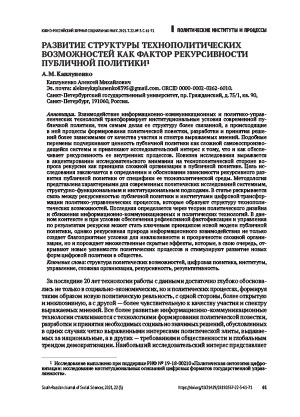Аннотация
Взаимодействие информационно-коммуникационных и политико-управленческих технологий трансформирует институциональные условия современной публичной политики, тем самым делая ее структуру более связанной, а происходящие в ней процессы формирования политической повестки, разработки и принятия решений более зависимыми от качества участия и спектра выражаемых мнений. Подобные перемены подчеркивают ценность публичной политики как сложной самовоспроизводящейся системы и привлекают исследовательский интерес к тому, что и как обеспечивает рекурсивность ее внутренних процессов. Новизна исследования выражается в акцентировании исследовательского внимания на технополитической стороне вопроса рекурсии как принципа сложной организации в публичной политике. Цель исследования заключается в определении и обосновании зависимости рекурсивного развития публичной политики от специфики ее технополитической среды. Методология представлена характерными для современных политических исследований системным, структурно-функциональным и институциональным подходами. В статье раскрывается связь между рекурсивностью публичной политики и институтами цифровой трансформации политико-управленческих процессов, которые образуют структуру технополитических возможностей. Последняя определяется через теории политического дизайна и сближения информационно-коммуникационных и политических технологий. В данном контексте и при условии обеспечения рефлексивной фактофиксации и управления по результатам рекурсия может стать ключевым принципом новой модели публичной политики, однако рекурсивная природа информационного взаимодействия не только создает благоприятные условия для инклюзивности и прозрачности сложной организации, но и порождает множественные скрытые эффекты, которые, в свою очередь, открывают новые уязвимости политических процессов и стимулируют развитие новых форм цифровой политики в обществе.
Ключевые слова
Информация о финансировании
Исследование выполнено при поддержке РНФ № 19-18-00210 «Политическая онтология цифровизации: исследование институциональных оснований цифровых форматов государственной управляемости».
Библиографические ссылки
Begtin, I., Bertyakov, A., Komin, M., Parkhimovich, О., Tsygankov, M. (2020). Otsenka otkrytosti gosudarstvennykh informatsionnykh sistem v Rossii: analiticheskii doklad [Assessment of the Openness of State Information Systems in Russia: Analytical Report]. Retrieved from https://roskazna.gov.ru/upload/iblock/534/otsenka-otkrytosti-gosudarstvennykh-informatsionnykh-sistem-v-rossii.pdf
Chandler, D. (2019). Digital Governance in the Anthropocene: The Rise of the Correlational Machine. In D. Chandler, C. Fuchs (Eds). Digital Objects, Digital Subjects: Interdisciplinary Perspectives on Capitalism, Labour and Politics in the Age of Big Data (pp. 23–42). London: University of Westminster Press. DOI:10.16997/book29.b
Chugunov, A. V. (2018). Institutsional’naya model’ elektronnogo upravleniya: osnovnye aktory i mekhanizmy ikh vzaimodeistviya [Institutional Model of Electronic Governance: The Main Actors and Mechanisms of Their Interaction]. Gosudarstvo i grazhdane v elektronnoi srede [State and Citizens in the Electronic Environment], 2, 66–70. DOI:10.17586/2541-979X-2018-2
Colebatch, H. К. Policy. (1998). University of Minnesota Press.
Coleman, S., Freelon, D. (2015). Introduction: conceptualizing digital politics. In S. Coleman, D. Freelon (Eds). Handbook of Digital Politics (pp. 1–13). Cheltenham-Northampton: Edward Elgar Publishing. DOI:10.4337/9781782548768
Dobrolyubova, E. I., Yuzhakov, V. N., Yefremov, A. A., et al. (2019). Tsifrovoe budushchee gosudarstvennogo upravleniya po resul’tatam [The Digital Future of the Result-based Governance]. Moscow: Delo.
Foerster, H. (1979). Cybernetics of Cybernetics. In K. Krippendorff (Ed.). Communication and Control in Society (pp. 5–8). New York: Gordon and Breach. DOI: 10.1007/0-387-21722–3_13
Heclo, H. (1974). Modern Social Politics in Britain and Sweden: From Relief to Income Maintenance. New Haven: Yale University Press.
Hofmann, J., Katzenbach, C., Gollatz, K. (2017). Between Coordination and Regulation: Finding the Governance in Internet Governance. New Media and Society, 9, 1406–1423. DOI:10.1177/1461444816639975
Howlett, M. (2014). Policy Design: What, Who, How and Why? In C. Halpern, P. Lascoumes, P. Le Galès (Eds). L’instrumentation et ses effets (pp. 281–315). Paris: Presses de Sciences Po.
Hui, Yu. (2020). Rekusrivnost’ i kontingentnost’ [Recursiveness and Contingency]. Moskva: V-A-C Press.
Innis, H. (1950). Empire and Communications. Oxford: Clarendon Press.
Kaplunenko, A. M. (2019). Problema analiza struktury politicheskikh vozmozhnostei tsifrovizatsii publichnogo upravleniya v Rossii: regional’nyi aspect [An Issue on Analysis of Digital Public Governance Political Opportunities Structure in Russia: Regional Aspect]. Evraziiskaya integratsiya: ekonomika, pravo, politika [Eurasian Integration: Economics, Law, Politics], 4, 107–112.
Kaplunenko, A. M. (2021). K voprosu o kontseptual’nykh osnovaniyakh publichnoi politiki kak “epistemicheskogo ob”ekta” [To the Question of the Conceptual Basis of Public Policy as an “Epistemic Object”]. Informatsionnyi byulleten’ granta RNF № 19-18-00210 “Politicheskaya ontologiya tsifrovizatsii: issledovaniye institutsional’nykh osnovanii tsifrovykh formatov gosudarstvennoi upravlyaemosti” [Newsletter of RNF Grant 19-18-00210 “Political Ontology of Digitization: Study of Institutional Bases of Digital Government Formats”], 1(26), 8–12.
Kondratenko, K. S. (2021). Institutsional’naya rekursivnost’ publichnykh sotsiotekhnicheskikh sistem [Institutional Recursiveness of Public Socio-technical Systems]. Informatsionnyi byulleten’ granta RNF № 19-18-00210 “Politicheskaya ontologiya tsifrovizatsii: issledovaniye institutsional’nykh osnovanii tsifrovykh formatov gosudarstvennoi upravlyaemosti” [Newsletter of RNF Grant 19-18-00210 “Political Ontology of Digitization: Study of Institutional Bases of Digital Government Formats”], 1(26), 13–17.
Luhmann, N. (2005). Real’nost’ massmedia [The Reality of Mass Media]. Moscow: Praxis.
McAdam, D., Tarrow, C., Tilly, C. (2001). Dynamics of Contention. New York and Cambridge: Cambridge University Press.
Neverov, K. A. (2021) Interoperabel’nost’ v gosudarstvennom upravlenii kak rekursivnyi protsess [Interoperability in Public Administration as a Recursive Process]. Informatsionnyi byulleten’ granta RNF № 19-18-00210 “Politicheskaya ontologiya tsifrovizatsii: issledovaniye institutsional’nykh osnovanii tsifrovykh formatov gosudarstvennoi upravlyaemosti” [Newsletter of RNF Grant 19-18-00210 “Political Ontology of Digitization: Study of Institutional Bases of Digital Government Formats”], 1(26), 18–22.
Pravoslavskii, S. S. (2018). Rekursivnye mekhanizmy v sotsial’nykh sistemakh [Recursive Mechanisms in Social Systems]. Nauchnyi al’manakh [Science Almanac], 5–3, 86–91. DOI:10.17117/na.2018.05.03
Ryazanov, A. V., Demidova, M. V. (2015). Modeli discursivnogo i recursivnogo upravleniya simvolicheskim kapitalom v sotsial’no-ekonomicheskikh sistemakh [Discursive and Recursive Models of Symbolic Capital Management in Socio-Economic Systems]. Vestnik Povolzhskogo instituta upravleniya [The Bulletin of The Volga Region Institute of Administration], 4, 96–104.
Sabatier, P. (1998). The Advocacy Coalition Framework: Revisions and Relevance for Europe. Journal of European Public Policy, 1, 98–130. DOI: 10.1080/13501768880000051
Sabel, C., Moore, T. Maurice, Zeitlin, J. (2012). Experimentalist governance. In D. Levi-Faur. The Oxford Handbook of Governance (pp. 169–183). Oxford University Press. DOI: 10.1093/oxfordhb/9780199560530.013.0012
Shmatko, N. A. (2001). Phenomen publichnoy politiki [Phenomenon of Public Policy]. Sotsiologicheskie issledovaniya [Sociological Studies], 7, 106–112.
Smorgunov, L. V. (Ed). (2018). Publichnaya politika: instituty, tsifrovizatsiya, razvitie [Public Policy: Institutions, Digitalization, Development]. Moscow: Aspect Press.
Tilly, C., Tarrow, S. (2006). Contentious Politics. Boulder: Paradigm Publishers.
Yakimets, V. N. (2017). Novye formaty obshscestvenno-gosudarstvennogo upravleniya v Rossii [New Formats of Public-State Governance in Russia]. Gosudarstvo i grazhdane v elektronnoi srede [State and Citizens in the Electronic Environment], 1, 123–135. DOI:10.17586/2541-979X-2017-1-123-135.


